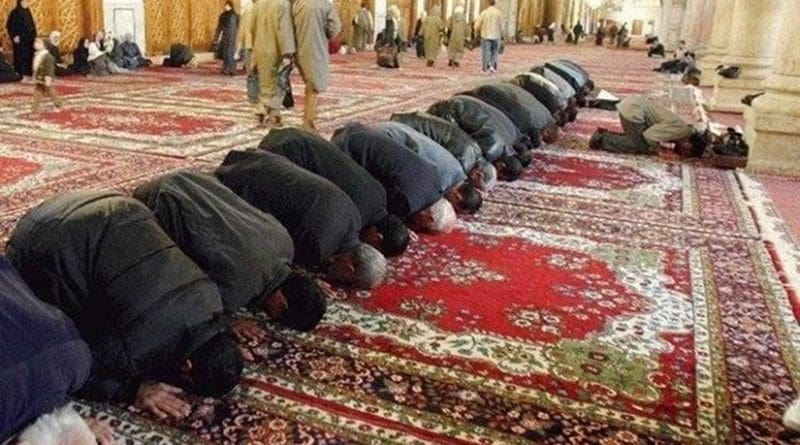Ramadan Is Here, But Muslim World Is Not At Peace With Itself – Analysis
Islam, A Religion Of Peace
Ramadan is one of the sacred months of the Muslim lunar calendar; ashhor al-Horum, but probably the most sacred of all and the most important socially in the sense that it is a month of prayer and celebration during which people pray more, recite the Quran and help out the needy.
Fasting from dawn to dusk is not only about abstaining from eating food, taking liquids and engaging in sexual intercourse but also about stopping speaking ill of others or undertaking any violent action against anybody and most importantly enduring the hardships of hunger to help out the indigent on a frequent basis. So it is about loving the other, caring about him and sharing food and money with him.
Religiously speaking, it is the most important month of the year in the sense that Allah revealed the Holy Book Koran through the angel Gabriel to the Prophet Muhammad, PBUH and it is worth the equivalent of thousand months. In this regard the Koran says clearly:
“Indeed We have revealed it (Qur’an) in the night of Power. And what will explain to you what the night of Power is? The night of Power is better than a thousand months. Therein descends the Angels and the Spirit (Jibreel) by Allah’s permission, on every errand: (they say) “Peace” (continuously) till the rise of Morning!” ( 97:1-5)
Ramadan, the nine month of the Islamic calendar is all about respect, compassion, love of the other and self-restraint. Self-restraint from thinking ill, doing ill and speaking ill such as backbiting and gossip:
“O ye who believe! Fasting is prescribed to you as it was prescribed to those before you, that ye may (learn) self-restraint.” (2: 183).
The Prophet Muhammad, PBUH, addressed his companions on the last day of Sha`ban, saying:
“Oh people! A great month has come over you; a blessed month; a month in which is a night better than a thousand months; month in which Allah has made it compulsory upon you to fast by day, and voluntary to pray by night. Whoever draws nearer (to Allah) by performing any of the (optional) good deeds in (this month) shall receive the same reward as performing an obligatory deed at any other time, and whoever discharges an obligatory deed in (this month) shall receive the reward of performing seventy obligations at any other time. It is the month of patience, and the reward of patience is Heaven. It is the month of charity, and a month in which a believer’s sustenance is increased. Whoever gives food to a fasting person to break his fast, shall have his sins forgiven, and he will be saved from the Fire of Hell, and he shall have the same reward as the fasting person, without his reward being diminished at all.” [Narrated by Ibn Khuzaymah]
Sharing And Caring
The world is not a fair environment; there are rich people but also many poor people. There are the haves and the have nots and as such Ramadan is a month of compassion and piety. The faithful by fasting for hours during daylight are thus meant to experience hunger, to experience thirst for only a month whereas the indigent have to live with hunger and lack of means. Therefore this month is a test month to make the pious think about the wretched of the land and come to their rescue now and then with money, food and care.
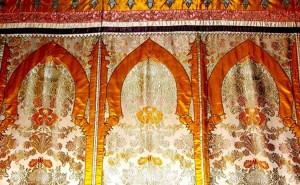
The importance of helping out the needy is highlighted even more at the end of the month-long fast by the obligatory charity every Muslim have to make to the indigent to validate his fast. It is zakat al-Fitr.
Islam is a community-based religion meaning that communities are morally instructed care about the needs of their people and create a close-knit social fabric where the poor do not feel left out and do not feel different. Is not it the case after all that the Muslim prayers when performed at the mosque people stand in lines irrespective of their wealth or power position? It is not said anywhere in the scriptures that the wealthy and powerful stand up front.
The Meaning Of Ramadan
Many people think of Ramadan as a month of privation followed excessive eating, a month of praying, staying out late at night reveling and having a good time and then next day failing to fulfill normal workload on the excuse that one is fasting.
Ramadan is not this, it is the entire contrary. It is a month of testing and endurance, a month of prayer and piety, a month of giving and helping out the other. It is a month of peace with oneself and the whole world.
So the month of Ramadan, highlights among the faithful such important values as:
- Generosity: It is not only about money, it is most importantly about care and concern, brotherhood of men and compassion. The poor have to feel that they are not left out in the open to endure privation alone; the community is there to extend a helping hand to them when needed;
- Compassion: Deep awareness and feeling of distress and pity at the suffering or misfortune of another accompanied by the wish to relieve it and the desire to alleviate it. Sometimes just a kind word or a gesture of concern can make the world a better place.
- Kindness: The state and quality of being kind and considerate towards the rest of the community so that people will feel equal in spite of social differences. Kindness is the cement that keeps the community united as one and ready to face outside challenges.
- Solidarity: The feeling or expression of union in a group formed by a common interest and unanimity of purpose and attitude.
In principle Islamic society is a close-knit gathering of the faithful irrespective of color, culture or social standing. It is the ummah (nation of the faithful) wherever they reside and whoever they are. Indeed, the concept of one ummah is highlighted furthermore during the Hajj (pilgrimage, one of the five pillars of Islam) when people from all over the world meet to strengthen their faith through a number of rituals meant to bring the faithful together and make them one in their love of Allah and in their love of each other.
Allah has called on the Muslims to unite, to help out each other and indeed all the pillars of Islam are about unity of purpose and commonality of destiny.
Shahada (Profession Of Faith)
The profession of faith is statinging with much conviction, “la ilaha illa Allah, Muhammad rasulu Allah.” This saying means “There is no true god (deity) but God (Allah), and Muhammad is the Messenger (Prophet) of God.” The first part, “There is no true god but God,” means that none has the right to be worshiped but God alone, and that God has neither partner nor son. This profession of faith is called the shahada, a simple formula which should be said with conviction in order to convert to Islam. The profession of faith is undoubtedly the most important pillar of Islam.
Salat (Praying)
Muslims perform five prayers a day. Each prayer does not take more than a few minutes to perform.
Prayer in Islam is a direct link between the worshiper and God. There are no intermediaries between God and the worshiper. In prayer, a person feels inner happiness, peace, and comfort, and that God is pleased with him or her.
The Prophet Muhammad said: {Bilal, call (the people) to prayer, let us be comforted by it.} Bilal was one of Muhammad’s companions who was charged to call the people to prayers. Prayers are performed at dawn, noon, mid-afternoon, sunset, and night. A Muslim may pray almost anywhere, such as in fields, offices, factories, or universities.
Giving Zakat (Support Of The Needy)
All things belong to God, and wealth is therefore held by human beings in trust. The original meaning of the word zakat is both “purification” and “growth.” Giving zakat means “giving a specified percentage on certain properties to certain classes of needy people.” The percentage which is due on gold, silver, and cash funds that have reached the amount of about 85 grams of gold and held in possession for one lunar year is two and a half percent. Our possessions are purified by setting aside a small portion for those in need, and, like the pruning of plants, this cutting back balances and encourages new growth.
A person may also give as much as he or she pleases as voluntary alms or charity.
Fasting The Month Of Ramadan
Every year in the month of Ramadan, all Muslims fast from dawn until sundown, abstaining from food, drink, and sexual relations.
Although the fast is beneficial to health, it is regarded principally as a method of spiritual self-purification. By cutting oneself off from worldly comforts, even for a short time, a fasting person gains true sympathy with those who go hungry, as well as growth in his or her spiritual life.
The Pilgrimage To Makkah
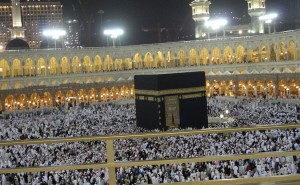
The annual pilgrimage (Hajj) to Makkah is an obligation once in a lifetime for those who are physically and financially able to perform it. About two million people go to Makkah each year from every corner of the globe. Although Makkah is always filled with visitors, the annual Hajj is performed in the twelfth month of the Islamic calendar. Male pilgrims wear special simple clothes which strip away distinctions of class and culture so that all stand equal before God.
The rites of the Hajj include circling the Kaaba seven times and going seven times between the hillocks of Safa and Marwa, as Hagar did during her search for water. Then the pilgrims stand together in Arafa and ask God for what they wish and for His forgiveness, in what is often thought of as a preview of the Day of Judgment.
The end of the Hajj is marked by a festival, Eid Al-Adha, which is celebrated with prayers. This, and Eid al-Fitr, a feast-day commemorating the end of Ramadan, are the two annual festivals of the Muslim calendar.
Islam In Pain: Torn Apart By Chaos
Ramadan is here, but the Muslim world is in pain. It is not in peace with itself. It is torn apart by civil wars, by violence and discontent.
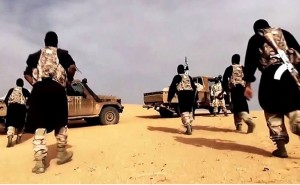
Chaos is coming to the Middle East in the aftermath of the failure of the so-called Arab Spring, and it is coming big. However, one wonders, quite rightly, if the chaos in question, brought about by the national chapters of the multinational of terrorism al-Qaeda and extremists of different Islamic colorations, is not the chaos prophesied or sown by President Bush Jr and his Secretary of State Condoleezza Rice after the fall of Saddam’s Iraq?
The very al-Qaeda that was felt out by the Arab uprisings years ago and that was beheaded by the American military machinery when killing, in a daring operation executed by the Navy Seals in Abbotabbad, Pakistan, its charismatic leader Bin Laden.
Al-Qaeda is coming back, in the form of ISIS, with the promise of more death and chaos in the region. Bin Laden might be dead, but the nihilist philosophy of the movement is still alive and kicking with Al-Baghdadi, thank you very much.
ISIS does not want a democratic Middle East because that would mean its demise, since it is a theocratic absurdity and not a democratic movement. It is a faceless beast that thrives on chaos and it has lethal dormant cells in this part of the world in addition to many sympathizers and followers worldwide.
How Did Chaos Come To The Region?
Actually, many analysts believe that chaos came to the region when the Tunisian vegetable seller Bouazizi set fire to his body, and by so doing igniting the Arab uprisings, but the truth of the matter is that the door to chaos was opened by the invasion of Kuwait undertaken by the megalomaniac pan-Arab dictator Saddam Hussein. At the height of his career, after the war with Iran, he believed strongly that he could do anything and get away with it, and since he owed so much money to Kuwait and was not ready to pay it back, he decided to rob the bank named Kuwait and settle the problem once for all.
Thus, on July 1st, 1991, he sent his army into Kuwait on the ground that it was part of historical Iraq before the arrival of British colonialism. On discovering oil in this territory, the British decided to create a mini state to serve their purpose of controlling oil flow in the region, maybe Brunei Darussalam is a similar case in South East Asia, and even today Malaysia has not swallowed the bitter pill of the British creation of this small state out of its national territory.
By invading Kuwait and robbing its wealth, Saddam Hussein inadvertently opened the gates of hell on the region. Fearing the fact that emboldened by his act in this small country, he would sweep through Saudi Arabia and the rest of the Gulf States; the West expected the worst and started preparations to counter his moves.
If Saddam had succeeded in controlling the Gulf States, he would have controlled the oil routes and the flow of this important commodity necessary for the whole world and especially for the developed countries whose economies rely on it heavily. Has this have happened, the world would have gone anew on a recession as in 1973 when the Arab countries imposed an oil embargo on the West following the Ramadan War.
So to avoid this happening again, the West moved quickly to put an end to the threat represented by Saddam to its interests and to the security of the friendly countries of the area. America armed with the resolutions of the United Nations, put together a large coalition of 34 countries to liberate Kuwait.
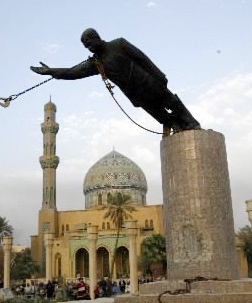
The Gulf War I, codenamed Operation Desert Storm took place from 17 January 1991 to 28 February 1991, and the coalition, in no time, achieved the declared objectives of this campaign. The Iraqi army was defeated and expelled from Kuwait and the door of hell and chaos on the area was opened wide.
While most the armies of the coalition returned home after completing the assigned mission, American troops remained in the area to protect their allies and with them remained an unanswered question: why did not President Bush Sr. order the American troops to go in hot pursuit of Iraqi defeated soldiers? The answer is that such a project is another episode for which the US had a different agenda.
However, the Americans still, indirectly, encouraged the Shi’ites to rise against Saddam which they did in the southern provinces but their revolt was crushed in blood. It seems that the Americans when encouraging such a move had two things in mind, knowing better the demonic psychology of Saddam in addition to making Saddam regain confidence in his power after the defeat and, also, increase the enmity of the Shi’ites against his rule to utilize them appropriately in the second episode of the onslaught on his rule.
Following this bloody episode, the Shi’ites became the fifth column of the Americans by which they would prepare the final assault on Saddam Hussein and his eviction from power for ever. The Shi’ites role was not only to assist the Americans in their designs but also lead the country after the fall of Saddam, given that they are numerically a majority in the country and was always ruled by a Sunni minority.
In the interval to the Gulf War II of 2003, the Shi’ites helped the American intelligence community in preparing for this final chapter of war on Saddam. They were instrumental in collecting military and civilian data for use by the Americans and in training their troops to have access to power and usher in chaos in the region.
The Neo-Inquisition
The Charlie Hebdo unfortunate and condemnable criminal act cannot be justified at all, whether in the Islamic religion or any religion, for that matter. It is an abominable act of violence and terrorism. It is a terrible face-off between religious radicals and intellectual extremists that were at each other’s throat for some time; each believing to be, the one and only, to hold the universal truth, when truth is in fact multifaceted.
Alas, this heinous and inhuman act is going to justify the upcoming emotional and physical violence and, probably, who knows, the repeat of the Inquisition, after the fall of Grenada in 1492 and the Reconquista of Muslim Spain. The European Muslims are already in the grip of moral terror and nobody can protect them now. Maybe, like what happened with the Moors and the Jews of Spain, they will be given the choice of either to convert to Christianity or leavei and that is what probably Eric Zemmour is referring to when he invoked mass deportation: indirect coercion.
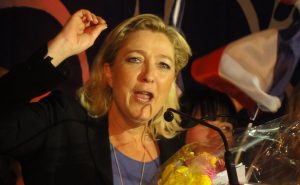
As for the writer Michel Houellebecq, he is actually missing the point, the next President in 2022, or even before then, is going to be Le Pen and not a Muslim. He knows that very well. His book is a tool to spread fear and, maybe, make the Muslims leave without any political, economic or ethical price. It would be nice, to get rid of the “Islamic evil” without any effort or cost. The political fiction of Houellebecq is ridiculous. How can 5 million Muslims win a presidential election, even if some other party gives them their votes or enters in alliance with them? How could they get a majority in the parliament and how could they sustain this majority?
Houellebecq cultivates fear in a horrendous way, he asserts that when Muslims arrive to power, though they will pretend to be moderate, yet they will allow polygamy, suppress women and bar them for working and going out, outlaw alcohol and make fasting Ramadan and praying five times compulsory.
However, in the midst of all this verbal violence, there are some voices that are calling for tolerance, like the journalist Christoph Hasselbach, who wrote in the German Qantara:ii
“We cannot deceive ourselves here: living together is not going to get any easier. This is why it is all the more important to remain level-headed. Yes, this is an horrific attack on our freedom, which can never be justified. We will not let anyone take this freedom from us. But nor must we let anyone take away our tolerance. There is no reason to put all Muslims under general suspicion or to doubt the model of a peaceful coexistence.”
Islamophobia On The Rise
Prior to the Paris two brutal and violent incidents, there were demonstrations against Islam in various European cities; the most prominent were the Pegida protests of Germany. In France a controversial essayist, Eric Zemmour has called for mass deportation of the Muslims. To where, bearing in mind that most of them are second, third or even fourth generation French citizens?
All of this denotes, one and only one thing, probably a European desire to get rid of the migrants because, by now, they have become a true social burden on these countries: so much for the “multi-cultural society” discourse.
Western State Terrorism
None wants to be apologetic for any form of terrorism, but one wonders why there is no debate on the state terrorism of the West on the Muslim world. The West has been emasculating the Muslim world uninterruptedly since the 19th century, to exploit unashamedly its riches. At times, using violence and, at other times, comploting, and this still continues today, and by so doing, deny democracy to the people of this vast area.
When the US-led coalition declared war on Saddam, they used all kind of weapons to bring down Iraq to its knees, killing and maiming thousands of civilians in this country. Iraq is gone to the dogs forever. Now, it is a fragmented country, where Sunnis and Shi’ites are exterminating each other, slowly but surely. Not to mention that the destruction of Iraq, undertaken methodically by the West, has led to the appearance of an absurd regime that calls itself The Islamic State -IS- and wants to take, by sheer force, the whole Islamic world to the time of the Caliphate, a rather ridiculous move and action. Today, sensible Muslims are wondering, quite rightly, who is behind this laughable and dangerous creation, and who wants to make the Muslims the laughing stock of the world?
In Afghanistan, the West and its military arm, NATO, has been destroying systematically the poorest country of the world and with it the wretched lives of its people, for over a decade, and today the former are pulling out of the country, without having achieved anything, but more hatred and more radicalism, which will breed more violence and more terrorism in the future.
They did not, even, apologize to the living, for their war crimes; they just called them collateral damage. Therefore, that means that the life of a single Western person is worth that of thousands in the Muslim world.
American Jihad
When the Soviets invaded Afghanistan, the West put pressure on Saudi Arabia to call for Jihad against the invading Red Army. Pakistan was solicited to train the thousands of young people coming from all over the world to fight. When the Soviets were defeated and sent home packing, there was pressure on Pakistan to send the Jihadists back to their countries of origin and those who escaped been rounded, created with Bin Laden al-Qaeda, with the aim of punishing America for its ungrateful treatment, which they duly did.
Since then, the Islamists are on the rise because the can of worms was opened and nobody could control the spread of the vermin, anymore. The result started with the unfortunate and unpardonable 9/11 and it continues unabated today with condemnable terrorist attacks in the West and Muslim world alike.
A Last Thought
The Muslim world is faced, today, more than ever, with many challenges: poverty, illiteracy, corruption, patriarchy, nepotism, absolutism, etc. it surely needs peace to get on with its development and democratic drive.
May this Ramadan bring peace and well-being to all Muslims, wherever they are? Amen.

